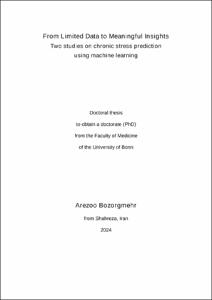From Limited Data to Meaningful InsightsTwo studies on chronic stress prediction using machine learning

From Limited Data to Meaningful Insights
Two studies on chronic stress prediction using machine learning

| dc.contributor.advisor | Weltermann, Birgitta | |
| dc.contributor.author | Bozorgmehr, Arezoo | |
| dc.date.accessioned | 2024-02-01T15:34:49Z | |
| dc.date.available | 2024-02-01T15:34:49Z | |
| dc.date.issued | 01.02.2024 | |
| dc.identifier.uri | https://hdl.handle.net/20.500.11811/11291 | |
| dc.description.abstract | Background: Chronic stress is widespread and adversely affects mental and physical health. The two studies in this dissertation used machine learning to predict chronic stress and identify its risk as well as protective factors. The first study examined workplace factors in German general practice assistants, while the second developed an interpretable model using a national dataset from the Robert Koch Institute to identify protective factors for improved well-being. Methods: The first study analyzed 550 general practice assistants comparing 4 machine learning classifiers (random forest, support vector machine, K-nearest neighbors, and artificial neural network) and logistic regression to predict chronic stress. The model performance was evaluated using metrics such as the area under the curve (AUC), sensitivity, and positive predictive value. The second study investigated chronic stress in the German population using data from 5,801 in the representative DEGS1 study. Multiclass classification with extreme gradient boosting (XGBoost) and Shapley additive explanations (SHAP) was employed to predict stress levels and especially identify protective factors. The evaluation metrics included the area under the curve (AUC), precision, recall, and F1-score, which were averaged using the macro average. Results: In the first study, machine learning models outperformed logistic regression in predicting chronic stress among practice assistants. The random forest model achieved the highest AUC of 84 %. Work characteristics were identified as relevant factors. In the second study, the XGBoost model obtained an AUC of 81 %, a precision of 63 %, a recall of 52 %, a specificity of 78 %, and a F1-score of 54 %. The study identified several protective factors against chronic stress like satisfaction with living space, strong social support, being male, and age = 42 years. Conclusion: Machine learning classifiers, specifically ensemble methods, demonstrated superior performance compared to logistic regression and other ML approaches in predicting chronic stress even with small data sets. Aiming at reliable feature importance detection, the SHAP technique identified significant protective factors that should be taken into account when designing interventions to alleviate chronic stress. | en |
| dc.language.iso | eng | |
| dc.rights | In Copyright | |
| dc.rights.uri | http://rightsstatements.org/vocab/InC/1.0/ | |
| dc.subject | artificial intelligence | |
| dc.subject | machine learning | |
| dc.subject | prognostic | |
| dc.subject | model | |
| dc.subject | chronic stress | |
| dc.subject | resilience factors | |
| dc.subject | interpretable model | |
| dc.subject | explainability | |
| dc.subject | stress | |
| dc.subject | disease | |
| dc.subject | diabetes | |
| dc.subject | cancer | |
| dc.subject | dataset | |
| dc.subject | clinical | |
| dc.subject | data | |
| dc.subject | gender | |
| dc.subject | social support | |
| dc.subject | support | |
| dc.subject | intervention | |
| dc.subject | SHAP | |
| dc.subject | primary care | |
| dc.subject | general practice | |
| dc.subject | medicine | |
| dc.subject.ddc | 610 Medizin, Gesundheit | |
| dc.title | From Limited Data to Meaningful Insights | |
| dc.title.alternative | Two studies on chronic stress prediction using machine learning | |
| dc.type | Dissertation oder Habilitation | |
| dc.identifier.doi | https://doi.org/10.48565/bonndoc-214 | |
| dc.publisher.name | Universitäts- und Landesbibliothek Bonn | |
| dc.publisher.location | Bonn | |
| dc.rights.accessRights | openAccess | |
| dc.identifier.urn | https://nbn-resolving.org/urn:nbn:de:hbz:5-74487 | |
| dc.relation.doi | https://doi.org/10.1371/journal.pone.0250842 | |
| dc.relation.doi | https://doi.org/10.2196/41868 | |
| ulbbn.pubtype | Erstveröffentlichung | |
| ulbbnediss.affiliation.name | Rheinische Friedrich-Wilhelms-Universität Bonn | |
| ulbbnediss.affiliation.location | Bonn | |
| ulbbnediss.thesis.level | Dissertation | |
| ulbbnediss.dissID | 7448 | |
| ulbbnediss.date.accepted | 06.11.2023 | |
| ulbbnediss.institute | Medizinische Fakultät / Institute : Institut für Hausarztmedizin | |
| ulbbnediss.fakultaet | Medizinische Fakultät | |
| dc.contributor.coReferee | Ghofrani, Javad | |
| ulbbnediss.contributor.orcid | https://orcid.org/0000-0003-3020-1332 |
Files in this item
This item appears in the following Collection(s)
-
E-Dissertationen (1997)




